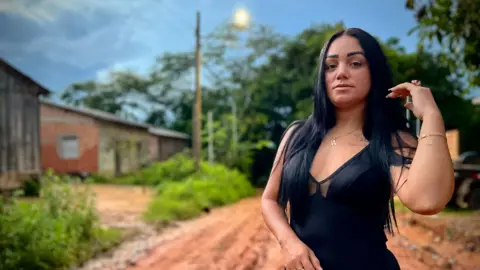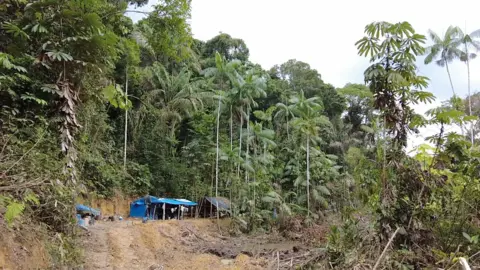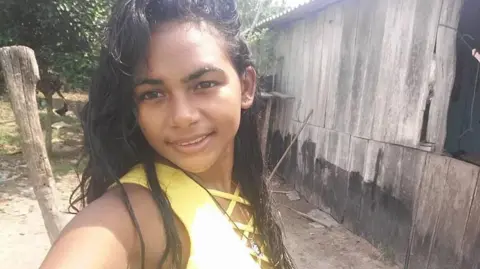Selling sex in exchange for gold in Amazon’s illegal mines

 BBC
BBCDayan Leete never wanted to be a sex worker but at the age of 17, her husband died of a heart attack and she couldn’t afford a funeral.
Her hometown, Itaituba in Brazil’s northern Pará state, is at the center of the country’s illegal gold mining trade, so a friend suggested she raise money by having sex with miners deep in the Amazon.
“Going into the mines is like rolling a dice,” she says.
“Women are severely humiliated there. They may be slapped in the face and yelled at.
“I was sleeping in my bedroom and a guy jumped out the window and held a gun to my head. And if they pay, they want to own the women.
Dayane successfully raised money for the funeral and had her first child at the age of 18. For the past 16 years, like many women in Itaituba, she has returned periodically to the mines to work as a cook, washerwoman, barmaid and sex worker.
Now he has a family of seven people.

“I wouldn’t say all women in the city do it, but a large number of them do sex work. So it’s normal in a way. We don’t really care,” says Natalia Cavalcante, who became a sex worker in a remote mining settlement at the age of 24. Four years later, after marrying a bar owner, she became a brothel madam – a job she had only recently given up, in order to look after her nieces in the city.
Life in mining villages in the rainforest is hard – most have just a dirt track, saloon bar and a church. But the miners themselves live even further outside, in huts made of wood and canvas, surrounded by snakes and jaguars, and in complete darkness after the generators are shut down. Women who work as cooks have to live in these camps with men.
Natalia says that whenever miners find gold and have money to spend, they appear in the village. Women say that sometimes they have to be persuaded to take a bath before sex.
Running a brothel is illegal under Brazilian law, but Natalia says she took no commission, she just hired bar staff and rented out the rooms.
Young women would approach her asking for work, and she would sometimes lend them money for the trip to Itaituba, a seven-hour drive.

Asked if she had doubts about including other women in the work, she replied: “Sometimes I think: ‘I’ve been through it, and I know it’s not as good. ‘ But then I think: ‘A girl has a family, sometimes a child to raise. Many of the girls who go have one or two children.’ So we accept it.”
Natalia had earned a lot of money even before marriage.
She now had her own house in Itaituba, a motorcycle and a considerable amount of gold which she sometimes received as payment for sex, two or three grams at a time. His goal is to study, become a lawyer or an architect.
She says some women in Itaituba, known as Gold Nugget City, have set themselves up in business with their earnings.
But going into violent and lawless mining settlements as a woman is a huge risk.
While the environmental damage caused by mines is well known, the human cost – which the UN says includes violence, sexual exploitation and trafficking – goes largely unreported.
A precious metals trader told the BBC that illegal gold from these mines would typically be relabeled as gold from a licensed mining cooperative before being exported and used in jewelery and mobile phones, or other electronic goods. Will be changed into components for.
The three largest customers of Brazilian gold are Canada, Switzerland and the UK. According to the Instituto Escolhas think tank, more than 90% of all exports to Europe come from areas where illegal mining occurs.

Murder of women in mining villages is not a new thing. The body of Raleigh Santos, 26, was found last year in the room where she was staying near the Cui-Cui gold mine, an 11-hour drive from Itaituba.
Her older sister, Raylen, says that a man offered her money for sex and she refused, so he later found her and beat her to death.
“A lot of women die every day, a lot of women,” Raylen says.
“I was born in the mines, I grew up in the mines and now I am afraid of living in the mines.”
A man has been arrested in connection with Rayleigh’s murder, but has not yet been charged. He denies all the allegations against him.
Brazil’s land covered by illegal gold mines is set to more than double to 220,000 hectares over the 10 years to 2023 – an area larger than Greater London. No one knows how many women work in the sector, or even how many illegal miners there are. The Brazilian government says the latter figure could be anywhere from 80,000 to 800,000.
Under President Luiz Inácio Lula da Silva, the government has taken steps to close illegal mines and prevent dealers from buying the gold they produce, but high gold prices are prompting many to try their luck .
Dayan wants to stop working in the mining fields because of the toll the exposure and hardship takes on her body, but she is planning what she hopes will be one last trip. Her goal is to earn enough in two or three months to open a snack bar when she returns, although she realizes she may not succeed.
“Whenever she is alone, wandering in the forest, she worries about her children,” she says.
“I’m going to keep trying until I’m more successful,” she says. “Because I think that one day, my kids will say: ‘My mom worked so hard. Whatever he endured, he endured and he never gave up.
Additional reporting by Mariana Schreiber, BBC Brazil
you can see BBC 100 Women Documentary, Sex for GoldFrom Saturday 7th December on BBC iPlayer
bbc 100 women Every year I name 100 inspiring and influential women from around the world. Follow BBC 100 Women Instagram And FacebookJoin the conversation using #BBC100Women,







